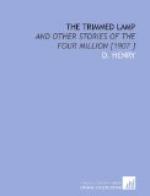A little thrill of satisfaction ran through Remsen, because he had a name to give which, without undue pride, was worthy of being spoken in high places, and a small fortune which, with due pride, he could leave at his end without disgrace.
He opened his lips to speak and closed them again.
Who was he? Mounted Policeman O’Roon. The badge and the honor of his comrade were in his hands. If Ellsworth Remsen, ten-millionaire and Knickerbocker, had just rescued pomegranate blossoms and Scotch cap from possible death, where was Policeman O’Roon? Off his beat, exposed, disgraced, discharged. Love had come, but before that there had been something that demanded precedence—the fellowship of men on battlefields fighting an alien foe.
Remsen touched his cap, looked between the chestnut’s ears, and took refuge in vernacularity.
“Don’t mention it,” he said stolidly. “We policemen are paid to do these things. It’s our duty.”
And he rode away—rode away cursing noblesse oblige, but knowing he could never have done anything else.
At the end of the day Remsen sent the chestnut to his stable and went to O’Roon’s room. The policeman was again a well set up, affable, cool young man who sat by the window smoking cigars.
“I wish you and the rest of the police force and all badges, horses, brass buttons and men who can’t drink two glasses of brut without getting upset were at the devil,” said Remsen feelingly.
O’Roon smiled with evident satisfaction.
“Good old Remsen,” he said, affably, “I know all about it. They trailed me down and cornered me here two hours ago. There was a little row at home, you know, and I cut sticks just to show them. I don’t believe I told you that my Governor was the Earl of Ardsley. Funny you should bob against them in the Park. If you damaged that horse of mine I’ll never forgive you. I’m going to buy him and take him back with me. Oh, yes, and I think my sister—Lady Angela, you know—wants particularly for you to come up to the hotel with me this evening. Didn’t lose my badge, did you, Remsen? I’ve got to turn that in at Headquarters when I resign.”
BRICKDUST ROW
Blinker was displeased. A man of less culture and poise and wealth would have sworn. But Blinker always remembered that he was a gentleman—a thing that no gentleman should do. So he merely looked bored and sardonic while he rode in a hansom to the center of disturbance, which was the Broadway office of Lawyer Oldport, who was agent for the Blinker estate.
“I don’t see,” said Blinker, “why I should be always signing confounded papers. I am packed, and was to have left for the North Woods this morning. Now I must wait until to-morrow morning. I hate night trains. My best razors are, of course, at the bottom of some unidentifiable trunk. It is a plot to drive me to bay rum and a monologueing, thumb-handed barber. Give me a pen that doesn’t scratch. I hate pens that scratch.”




